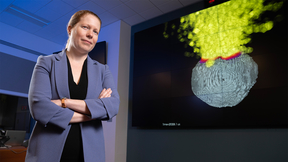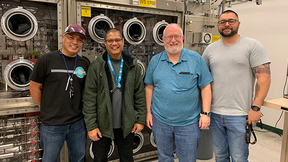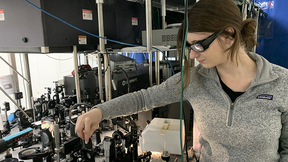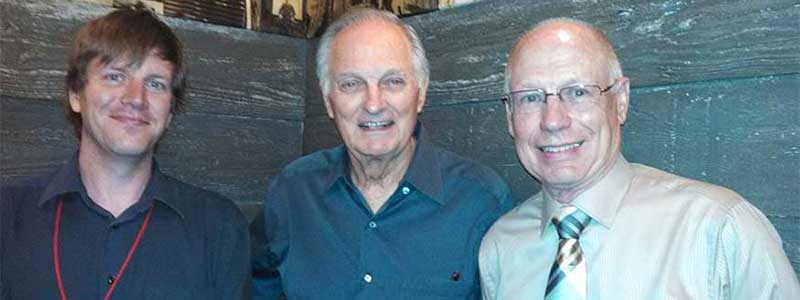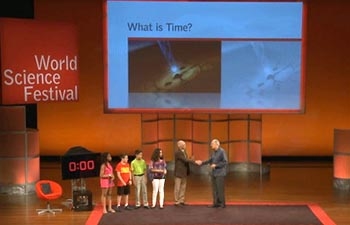Alan Alda awards Lawrence Livermore engineer for making science understandable
Nick Williams, a retired engineer and science presenter from Lawrence Livermore National Laboratory not only has done a fine job of conveying the concept of time to 11 year olds, he's being recognized for it. Williams took top honors in the written category of The Flame Challenge, a global science contest run by the Alan Alda Center for Communicating Science at Stony Brook University, and actor, science aficionado Alda.
The contest challenges scientists to explain complex scientific principles in simple terms so they could be clearly understood by a 5th grade student. In 2012 the question put to scientists was "What is a flame?" This year the question was "What is time?"
"I put myself in one of my 5th grade students' shoes," Williams said about his winning entry. "What I wrote is an off-the-cuff response, not relying on the Web or digging through time-related research. The explanation is what made sense to me, and what I thought a 5th grader could understand at this 'time' in his/her science education."
The creation of the Flame Challenge began with an event Alda recalls from his childhood. When he was 11 years old, he posed a complex question to his teacher, "What is a flame?" but was not satisfied with the answer ("It's oxidation"). The teacher's response did not explain, or satisfy, his curiosity. Alda, a visiting professor of journalism at Stony Brook, has been an advocate for the clear communication of science and collaborated with Stony Brook to institute the Flame Challenge.
Nearly 20,000 students judged the entries, including kids from Europe, Asia, Africa, Australia, South America and 38 states in America. Alda awarded the 2013 Flame Challenge winners at the World Science Festival June 2 in New York.
"At Lawrence Livermore we have a responsibility to communicate our work in science in an understandable yet interesting way to students, the community and our stakeholders. Through the Flame Challenge Nick has demonstrated the ability to take a complex subject such as time, and describe it in the simplest terms so that it can fully appreciated by all," Lab Director Parney Albright said. "Nick did a great job in getting to crux of this subject -- I want to congratulate him for his efforts."
Here is Williams' winning entry:
What is time?
Have you ever heard your parents say to you that it's time to go to bed or time to get up, time to go to school, time to clean your room, time to do this, time to do that, and on and on. Our world runs on a time schedule, and the schedule is so tight that there are schedules for everything we do throughout the day and clocks that tell you what time it is so we can do those things at the correct time. Time is so obvious in our lives that no one questions it. It's just there, we have to live with it, and so we accept it. All activity on Earth is based on time, and this time is what happened a second ago, a minute ago, an hour ago, days ago, and years ago. Well, now we have an important question. What is it?
Time has a lot of definitions; like time is history or time is age. But, have we ever considered a good definition? I have. Here's my definition. And no, I did not get this from some book or online. It's just something that makes sense to me. I think of time as Forward Movement. Think about it! Everything moves forward, from the universe to every second of your life. And because everything moves forward, man developed a way to keep track of this Forward Movement and called it time. Man also invented clocks to keep a precise log of this Forward Movement in years, days, hours, minutes, seconds, and even parts of seconds. I'll always continue to think of time as Forward Motion. I'll also think of it as a Forward Motion that will never change, will never stop, and can never be reversed.
Williams started his career in science as an electronic technician aboard the USS Point Defiance for the U.S. Navy. He graduated from Diablo Valley College with a degree in electronics and went on to work for Lawrence Livermore National Laboratory.
After retiring from the Laboratory in 2002 as an electrical engineer, Williams returned in 2007. Recognizing the need to effectively communicate science to the general public, and in particular to our next generation of scientists, Williams became a presenter for the Lab's "Fun With Science" program, where he conducts hands-on experiments for visiting students and other members of the local community.
He also is a member of the DeVry University Electronics Engineering Advisory Council and regularly volunteers for the American Cancer Society.
Contact
Linda A Lucchetti[email protected]
925-422-5815
Related Links
movieTags
ScienceFeatured Articles
